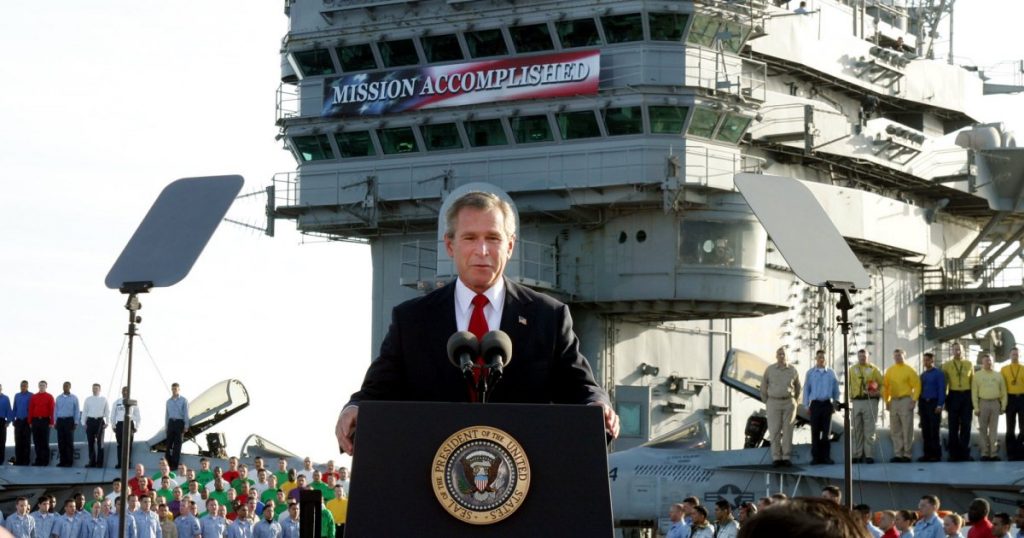With a War Against Iran Brewing, Don’t Listen to the Hawks Who Lied Us Into Iraq
J. Scott Applewhite/AP
Shortly after the news broke that a US airstrike in Baghdad ordered by President Donald Trump had killed Maj. Gen. Qassem Soleimani, the leader of Iran’s Quds Force, Ari Fleischer went on Fox News and proclaimed, “I think it is entirely possible that this is going to be a catalyst inside Iran where the people celebrate this killing of Soleimani.”
Here we go again.
Fleischer was press secretary for President George W. Bush when the Bush-Cheney administration deployed a long stretch of false statements and lies—Saddam Hussein was in cahoots with al Qaeda! Saddam had WMDs! Saddam intended to use WMDs against the United States! Saddam’s defeat would lead to peace and democracy in Iraq and throughout the region!—to grease the way to the March 2003 invasion of Iraq. In that position, Fleischer was a key spokesperson for the war. Prior to the invasion, he promised the war would lead to a bright future: “Once the Iraqi people see that Saddam and those around him will be removed from power, they’ll welcome freedom, they’ll be a liberated people.” Instead, Iraq and the region were wracked with destabilization and death that continues to this day. About 200,000 Iraqi civilians lost their lives in the chaos and violence the Bush-Cheney invasion unleashed, and 4,500 US soldiers were killed in their war.
Back then, Fleischer was just one of many cheerleaders for the Iraq war inside and outside the administration. In the aftermath of 9/11, Bush-Cheney officials (including Bush and Vice President Dick Cheney), neocon pundits, Capitol Hill lawmakers, and some liberal pundits were beating the drums of war, inciting the public with claims that Saddam was a direct and immediate threat to the United States. They insisted that a war with Iraq would be quick, easy, and cheap and turn Iraq and the Middle East into a bastion of democracy brimming with gratitude to the United States. They were wrong, they were misguided, they were arrogant, and in some cases they outright lied to whip up fear and boost popular support for the war. With Trump’s attack in Baghdad prompting talk about another US war in the Middle East, it’s a good time to remember those who misled the public prior to the Iraq war, so if they now try to participate in the national discourse about Trump’s potential war with Iran, we won’t get fooled again. At least not by them.
At the top of this list, of course, are the key architects and salespeople of that war: Bush, Cheney, Defense Secretary Donald Rumsfeld, Deputy Defense Secretary Paul Wolfowitz, and National Security Adviser Condoleezza Rice. None of these people should be given a podium—unless they come clean with the mother of all mea culpas. Colin Powell, the secretary of state at the time, may be a slightly different case. He became the No. 1 pitchman for the war, delivering an important speech at the United Nations weeks before the invasion to lay out the case for military intervention, but he was widely known at the time to be hesitant about the assault. He still has not disavowed his support for the attack, but he did concede in 2015 that the Bush-Cheney administration made “terrible strategic mistakes” during the war.
Whether or not the Bush-Cheney gang ride into the current picture, we will be seeing some of the same commentators from 2003 who paved the path to war. Here are a few to watch out for:
Sean Hannity: The Fox News loudmouth was pushing the same bombastic style in 2003. A month before the invasion, he declared, “We’re going to go in and we’re going to liberate this country in a few weeks and it’s going to be over very quickly. No, it’s going to be over very quickly. And what I’m going to tell you here is, you’re going to find, I predict, mass graves. We’re going to open up those…gulags and those prisons and you’re going to hear stories of rape and torture and misery, and then we’re going to find all of the weapons of mass destruction.” In the aftermath of the Soleimani attack—no surprise—he hailed Trump. As the top propagandist at Trump State TV, he will undoubtedly blow a similar horn this time.
David Brooks: Shortly before the invasion of Iraq, Brooks, then a writer for the Weekly Standard, participated in a panel discussion and summed up his support for the war by asking: Don’t you believe the people of Iraq desire democracy just as much as we do? It was really that simple for him. Days prior to the attack, he penned a column poking fun at people who approached the question of invading Iraq as a complex matter, and he praised Bush for being “resolute.” Bush’s manner seemed to matter more to him than pondering the possible consequences of the upcoming war. Now at his perch at the New York Times, will Brooks once again try to make the simplistic seem sophisticated?
Thomas Friedman. The big-think columnist of the New York Times, Friedman eventually took an anti-intellectual—and wrong-headed—approach to the Iraq war. Before the military action, he cautioned Bush not to “take the country to war on the wings of a lie,” though he argued there was a compelling argument for invading Iraq. In an interview soon after the invasion, Friedman claimed the attack was a legitimate response to 9/11 (never mind that Saddam had nothing to do with 9/11): “What we needed to do was to go over to that part of the world…and burst that [terrorism] bubble. We needed to go over there basically and take out a very big stick, right in the heart of that world, and burst that bubble. And there was only one way to do it…What they needed to see was American boys and girls going house to house, from Basra to Baghdad, and basically saying, ‘Which part of this sentence don’t you understand…Well, suck on this.’” For years, American soldiers and their families ended up paying the price for Friedman’s suck-on-this war—unfortunately, without much to show for their sacrifice.
John Bolton: Trump’s gone-but-not-forgotten national security adviser has long been an advocate of US military action in the Middle East. He essentially endorsed an Israeli nuclear strike against Iran in 2009. In 2002, as a senior State Department official, he peddled the case for war against Iraq. In one interview, he noted, “We are confident that Saddam Hussein has hidden weapons of mass destruction and production facilities in Iraq,” and he echoed the Bush-Cheney administration lines that the Iraqi people would “welcome the overthrow of a dictatorial regime” and that the US role in a post-invasion Iraq would be “fairly minimal.” After the Soleimani assassination, Bolton sent congratulations to the US military and tweeted that he hopes “this is the first step to regime change in Tehran.” He seemed to be looking forward to something bigger.
Bill Kristol: The editor of the Weekly Standard and a Fox News contributor at the time, Kristol was the drum major of the neocon go-to-war crowd in 2002 and 2003. He claimed that in an effort to obtain nuclear weapons, Saddam was “past that finish line! He’s past the finish line!” He declared that a war in Iraq “could have terrifically good effects throughout the Middle East.” Kristol maintained that “we can remove Saddam because that could start a chain reaction in the Arab world that would be very healthy.” He asserted, “We’ll be vindicated when we discover the weapons of mass destruction.” He also said, “Very few wars in American history were prepared better or more thoroughly than this one by this president.” He was repeatedly wrong, very wrong. These days, Kristol is a passionate and committed never-Trumper whose sincere and heartfelt opposition to the president seemingly led to the demise of his Weekly Standard. Will he apply his critical view of Trump to a possible Trump war with Iran? An active force on Twitter, Kristol, whose mother recently died, has yet to tweet about the latest developments in Iran.
The Washington Post editorial page: The paper’s editorial board was a loud and steady supporter of a war with Iraq in the months before the invasion. It cited 9/11 as a reason, though there was no evidence Saddam had been involved in that horrific attack on the United States. After Powell made his UN presentation, the paper editorialized, “it is hard to imagine how anyone could doubt that Iraq possesses weapons of mass destruction.” Actually, intelligence and weapons experts still had questions about Saddam and WMDs—as reported within the Washington Post‘s own news stories. But the editorial board paid no mind to its reporters. In the six months prior to the invasion, the Post ran editorials supporting the war at least 27 times.
The Wall Street Journal editorial page: A month before the invasion, the arch-conservative editorial board of the Wall Street Journal opined, “It will be the nasty weapons and the cheering Iraqis the coalition finds when it liberates the country.” Nope. The WSJ editorial page repeatedly cited as a source exiled Iraqi leader Ahmed Chalabi, whose Iraqi National Congress fed misinformation and disinformation to reporters to build a case against Saddam. Weeks after the invasion, the editorial board praised the war as a “success.” Yes, a success.
Judith Miller: As a reporter for the New York Times, Miller wrote numerous stories before the invasion that hyped the threat from Saddam, often relying on sources fed to her by Chalabi’s INC. For these efforts, her former colleague Maureen Dowd dubbed Miller a “woman of mass destruction.” In 2015, Miller defended her reporting by saying she had been at the time “accurately conveying wrong information.” These days, Miller is a Fox News contributor and may well be called up to provide commentary on Iran. Will she once again convey wrong information?
James Woolsey: Following 9/11, a circle of national security hawks embraced and promoted a bizarre and convoluted conspiracy theory that basically held that Saddam was behind the terrorist attack on the World Trade Center and other targets. And these so-called experts immediately began to push for military action against Iraq—a policy many of them had supported long before 9/11. Wolfowitz was part of this group. So was Woolsey, a former CIA director. Wolfowitz even sent Woolsey to England to press the British government for supposed evidence showing that Saddam was the mastermind of 9/11. (There was no such evidence.) Woolsey also pushed the theory—advanced by Cheney—that Mohamed Atta, the lead 9/11 hijacker, had met with an Iraqi intelligence officer in Prague months before 9/11. (This was not true either.) And Woolsey championed an Iraqi defector who claimed to have information on WMDs in Iraq, though this defector had been judged a fabricator by US intelligence. Woolsey was a walking intelligence failure throughout that period. These days, he freely offers his opinion on national security matters. On Wednesday—prior to the Soleimani airstrike—Woolsey appeared on the conservative Newsmax TV and said, “We ought to target all of the facilities of the Revolutionary Guard.”
Newt Gingrich: The former House speaker was a fierce proponent of blasting Saddam in the aftermath of 9/11. Days after the attack, he exclaimed, ”If we don’t use this as the moment to replace Saddam after we replace the Taliban, we are setting the stage for disaster.” And he continued as an enthusiastic proponent of US military action against Iraq. As another Fox regular these days—who comments on just about anything and everything—he, too, may see action as a wartime pundit. Gingrich was quick to tweet-support the airstrike against Soleimani: “It hurt the dictatorship profoundly while avoiding wholesale combat. Well done!”
There are plenty of other conservatives and hawks who sold and justified the Iraq war, before and after the invasion, with misrepresentations, falsehoods, or dumb ideas who might pop up on television screens, in op-ed columns, or on Facebook and Twitter in the coming days. But keep a careful watch on those listed above—and any Bush-Cheney alumni.
A few Iraq war hawks have acknowledged they were wrong. These people deserve a different sort of consideration. None of the unreformed cheerleaders of 2003 should be heeded now, but those willing to admit they blew it demonstrate that progress is possible. And that ought to be encouraged. Most notable among this small group is Max Boot, a longtime conservative foreign policy thinker. In his 2018 book, The Corrosion of Conservatism, he wrote, “I can finally acknowledge the obvious: It was all a big mistake. Saddam Hussein was heinous, but Iraq was better off under his tyrannical rule than the chaos that followed. I regret advocating the invasion and feel guilty about all the lives lost.” After the Soleimani attack, Boot retweeted an article that warned Trump’s move and further war could cause a nightmare. And on CNN, he noted, “There’s no question that killing Qassem Soleimani was justified…The question is, was it wise? Do we know what comes next? Do we have a game plan for managing this growing confrontation with Iran?”
David Frum, a prominent conservative anti-Trumper, also falls into the category of the self-rehabbed hawk. As a speechwriter in the Bush-Cheney White House, he penned Bush’s infamous “Axis of Evil” speech that placed a bull’s-eye on Iraq. But last year, he wrote of the Iraq war, “We were ignorant, arrogant, and unprepared, and we unleashed human suffering that did no good for anyone: not for Americans, not for Iraqis, not for the region. Almost two decades later, the damage to America’s standing in the world from the Iraq War has still not been repaired, let alone that war’s economic and human costs to the United States and the Middle East.” As for the prospect of war with Iran, he observed, “The project of a war with Iran is so crazy, it remains incredible that Donald Trump’s administration could truly be premeditating it. But on the off, off chance that it is, here’s a word of caution from a veteran of the George W. Bush administration: Don’t do it.”
Frum and Boot have learned from their own mistakes. Too many other war hawks from the 2000s, though, merely continued on, facing no reckoning. These pundits and peddlers of destruction deserve no serious place at the media table these days. After all, wars—especially stupid wars—ought to have consequences for those who help make them happen.





